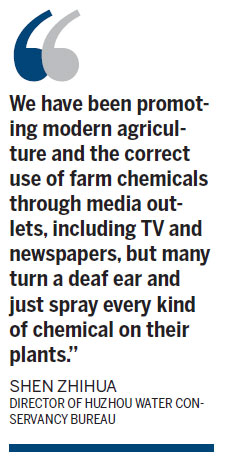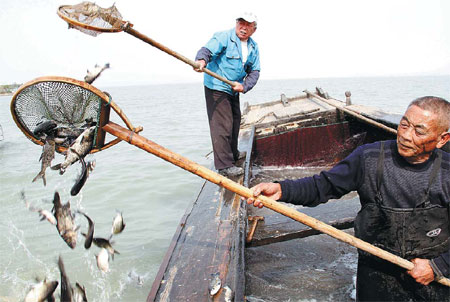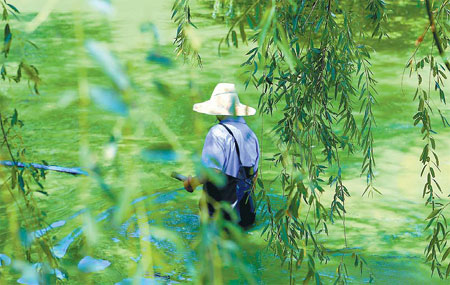Battle for lake shows dirty modern dilemma
Updated: 2013-03-22 07:04
By Xu Taotao, Wang Zhenghua in Zhejiang and Jiangsu (China Daily)
|
||||||||
|
Fishermen in Suzhou, Jiangsu province, introduced more than 15 million fish into Taihu Lake earlier this month. The prevention of serious pollution has required huge efforts from local authorities and lakeside residents. Zhu Guigen / Xinhua |
|
Foul-smelling blue-green algae blanketed a large swathe of the 2,338-sq-km Taihu Lake in August 2012. Provided to China Daily |

Algae choking freshwater supply triggers campaign against pollution, report Xu Taotao, Wang Zhenghua in Zhejiang and Jiangsu.
When Zhang Yan spoke of a "happy transformation", the native of Huzhou in Zhejiang province was referring to recent changes in his life and the environment of his hometown.
Six years ago, Zhang worked as a chef at a restaurant on one of the 24 private vessels floating in a harbor on the southern shore of Taihu Lake, one of China's largest freshwater bodies.
These vessels, along with hundreds of families living on the water, discharged untreated sewage directly into the lake every day.
When combined with other contaminants, such as industrial waste and fertilizer residue from farms, the southern part of the lake was badly affected by eutrophication.
This sees excessive levels of nutrients encourage the growth of plant life, especially oxygen-sapping algae. It can prove fatal to the aquatic environment.
On a typical summer day, foul-smelling blue-green algae blanketed a large swathe of the 2,338-square-kilometer lake, the source of drinking water for roughly 30 million people in nine cities across the provinces of Jiangsu and Zhejiang, and Shanghai.
"It was a very ugly scene," recalled Zhang. "It was as though there was a thick layer of green oil paint, dotted with all kinds of household rubbish, floating on the surface. The algae rotted and turned dark quickly, and gave out a strong smell of decay."
The colossal flow of pollutants from almost every direction outpaced the government's clean-up drive, and eventually led to a massive outbreak of algae in 2007, prompting the local authorities to employ serious measures to tackle the problem.
In Huzhou, on the lake's southern shore, a program was launched to restore the ecological balance. The measures undertaken included relocating the fishermen, and redeveloping the area around the lake.
Now 38-year-old Zhang works in the same area as a kitchen manager at a neat lakeside restaurant in a peaceful tourist resort.
It's now illegal to discharge untreated sewage water into the lake, and the thick layer of algae has all but disappeared. Visitors arrive in droves to admire the vastness of the lake.
The change has been dramatic, according to Zhang. Maybe not every family was happy with the relocation program, although it's a hot topic in areas all over China, but "the consensus is that the environment has improved greatly and that will benefit everybody," he said.
The problem of water pollution has risen in tandem with China's rapid urbanization and industrialization as the country's economic growth soared. Official figures indicate that there are roughly 1,700 water-pollution accidents every year and as many as 40 percent of the country's rivers are seriously polluted.
In recent weeks, thousands of rotting pig carcasses, believed to have been dumped by villagers upstream in a bid to avoid the high cost of disposal, have been found floating in Shanghai's Huangpu River, threatening the safety of the water supplied to millions of city residents.
About 130 km away in Wuxi city, Jiangsu province, a massive outbreak of algae on Taihu Lake in 2007 left millions of residents without tap water for a week.
Only in recent years have the harsh lessons learned from incidents such as this prompted residents to take water conservation seriously. Everyone was jolted into action to save the environment and the gifts of nature that had been taken for granted for so long.
China's economic liftoff guaranteed local governments more cash and leeway when they stepped up their clean-up efforts and the fight against pollution.
Following the 2007 water supply crisis, Wuxi, which sits on Taihu's northern shore, injected tens of billions of yuan into pollution control and improving the aquatic environment. The heavily industrialized city has closed or relocated more than 2,000 high-polluting or high-energy-consuming enterprises from the areas surrounding local lakes and rivers since 2007.
A sewage pipe network has spread across the urban area and most of the rural regions, channeling waste into plants where it is treated before being allowed to flow into the lake.
In addition, the city authorities set up a team of 1,000 members to scoop the blue-green algae from the surface of the lake during the summer, the main season for outbreaks, and recycle it as an energy source - dried algae burns easily - or as a fertilizer.
The measures have seen the frequency of the outbreaks decline every year, according to Wang Hongyong, director of the Wuxi Water Conservancy Bureau. The duration of the outbreaks has also been shortened; in years gone by they began as early as April, but now they occur later in the year and the area of water affected has shrunk, he added.
Relocate, rejuvenate
And outbreak of the foul-smelling algae also triggered a major project to reclaim the aquatic environment in Huzhou, a city of 2.6 million people on Taihu's southern shore. The surfaces of almost all the city's waterways turned an iridescent green, according to Li Dongmin, a retired official with the Huzhou-based Taihu Lake Tourist Resort Administrative Committee. "The stench permeated almost every corner of the city," he said.
In response, Huzhou launched a comprehensive environmental improvement project as part of its goal of becoming a modern, ecologically friendly city. The project has been successful enough for the city to begin promoting lakeside tourism in recent years.
Paper mills, cement plants and printing and dyeing works were closed and the discharge of untreated household and industrial sewage was banned. The lakeside areas were redeveloped and algae outbreaks were closely monitored.
The project also saw the relocation of more than 750 fishermen to new apartments ashore. Their floating homes were moored on a river that fed into the lake, with dire consequences. "These families used to discharge household rubbish and waste water into the river, which then flowed into the lake," Li recalled. "Their vessels were crowded on the river and made the 100-meter-wide waterway so narrow that only one vessel could sail through at a time."
Huzhou also decided to cut off the source of polluted water flowing into the lake, as part of an ongoing program costing 305 million yuan ($49 million) to treat smaller waterways in upstream Deqing county.
The program, which is scheduled for completion in 2016, aims to restore the ecological balance along the 505 km of the county's rivers, by clearing silt deposits, removing garbage and other solid surface waste, dredging and reinforcing the embankments.
Shi Weiqiang, a senior engineer at the county's water resources department, called the drive a clean-up of Taihu's "capillaries". The key is to desilt the rivers, which were contaminated by small dyeing workshops and chemical factories in the 1980s and 1990s, he said. "If left untreated, the pollutants and contaminated silt will flow into Taihu Lake during the flood season. This drive is designed to cut off all the upstream sources of pollution."
Local residents have also benefited; the water quality has improved and their villages look - and smell - much nicer, as desired by the advocates of "beautiful China" in the country's overall development plan.
The program has resulted in improved water quality every year, said Shen Zhihua, director of Huzhou's Water Conservancy Bureau.

Future challenges
However, greater efforts and more time are still needed to fully address the pollution, which is not an overnight phenomenon, but a "slow death" that began in the 1980s when industrial activity and residential development alongside the lake increased dramatically, said officials and experts.
The latest statistics provided by the Taihu Basin Authority under the Ministry of Water Resources indicate that a large swathe of the lake suffered medium-level eutrophication in 2011. Only 446 sq km, less than 20 percent, of the lake was classified as "fourth-class water" in 2011, indicating that it was only suitable for industrial use. Other parts of the lake were classified as "fifth-class water", meaning it is only suitable for agricultural use. If the rating falls any lower, the water will be declared unfit for human consumption.
Adding to the problem, the excessive use of fertilizers and pesticides is one of the biggest threats to the lake. The agricultural sector has outpaced industry to become China's biggest water polluter, one that's difficult to bring under control.
"Ecosystem services", the practice of offering incentives to farmers in exchange for managing their land in accordance with best ecological practice, have been under discussion for some time.
However, the source of the funding remains unclear, as does the means of distributing payments to farmers, said Hu Sunwen, head of the water administration and law-enforcement office under Huzhou Water Conservancy Bureau.
In light of the high level of investment in the control of water pollution, long-term management is now a major part of the effort to control water quality and prevent a recurrence of the problem.
Wuxi has implemented a system to allocate responsibility for the treatment of each river to an individual government official, a measure that's proved effective in reinforcing accountability if pollution occurs. So far, the city has appointed more than 1,200 of these officials, known as "river heads" to take overall control of anti-pollution efforts.
However, even as the authorities try to relieve the problem, the real solution lies with those who live in the areas around the lake, especially the farmers.
"We have been promoting modern agriculture and the correct use of farm chemicals through media outlets, including TV and newspapers, but many turn a deaf ear and just spray every kind of chemical on their plants," said Shen of the Huzhou Water Conservancy Bureau.
Wu Xinqiang, who owns a restaurant in Hongqi village in Daixi township, said the most common chemical used in his village is a herbicide applied to increase bamboo yields. "It's poisonous," he said. "But it is very hard to stop the villagers from using it."
Contact the writer at wangzhenghua@chinadaily.com.cn.
(China Daily 03/22/2013 page6)

 In Photos: 7.0-magnitude quake hits Sichuan
In Photos: 7.0-magnitude quake hits Sichuan
 Li Na on Time cover, makes influential 100 list
Li Na on Time cover, makes influential 100 list
 FBI releases photos of 2 Boston bombings suspects
FBI releases photos of 2 Boston bombings suspects
 World's wackiest hairstyles
World's wackiest hairstyles
 Sandstorms strike Northwest China
Sandstorms strike Northwest China
 Never-seen photos of Madonna on display
Never-seen photos of Madonna on display
 H7N9 outbreak linked to waterfowl migration
H7N9 outbreak linked to waterfowl migration
 Dozens feared dead in Texas plant blast
Dozens feared dead in Texas plant blast
Most Viewed
Editor's Picks

|

|

|

|

|

|
Today's Top News
Live report: 7.0-magnitude quake hits Sichuan, heavy casualties feared
Boston suspect cornered on boat
Cross-talk artist helps to spread the word
'Green' awareness levels drop in Beijing
Palace Museum spruces up
First couple on Time's list of most influential
H7N9 flu transmission studied
Trading channels 'need to broaden'
US Weekly

|

|









